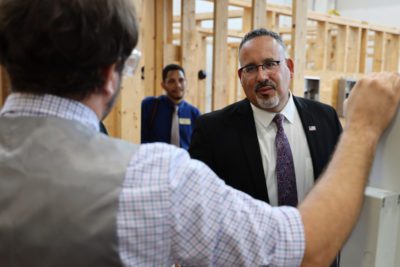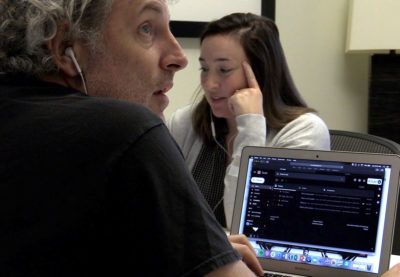
The Public School Forum of North Carolina unveiled its top education issues of 2021 during its 7th annual Eggs and Issues event, held virtually for the first time due to COVID-19.
The issues are inextricably tied to both equity and COVID-19, tackling topics ranging from broadband access to local school flexibility to meeting the constitutionally-mandated right for students to the opportunity for a sound, basic education.
“In education and beyond, COVID-19 illuminated and exacerbated the inequities that exist in our society, and the pandemic’s impact will undoubtedly be felt for many years to come,” said president and executive director of the Forum, Mary Ann Wolf, in a press release. “However, central to the Public School Forum of North Carolina’s mission is to identify policy recommendations that ensure all of our students in North Carolina have equitable access to a meaningful, high-quality education through a strong system of public schools, and we believe this year’s Top Education Issues address the current pandemic while also working toward that end.”
Look back at last year’s Eggs and Issues
The 10 issues highlighted this year are:
- Broadband access
- Teacher recruitment, retention, and diversity
- Social and emotional learning
- Inclusive, culturally responsive curriculum and pedagogy
- Flexibility for local school districts
- Assessment and accountability
- Afterschool programs and expanded learning
- Early childhood education and literacy
- Postsecondary attainment
- Adequate and equitable state funding to support public education
![]() Sign up for the EdDaily to start each weekday with the top education news.
Sign up for the EdDaily to start each weekday with the top education news.
For more detail on these issues, you can see the full report here or scroll through it below.
The Eggs and Issues event featured two panel discussions, one focused on equity and the other on COVID-19.
Panel 1: COVID-19 and North Carolina education policy
The panelists, listed below, started off by talking about some of the issues they think are most important this year.
- Dr. Catherine Edmonds, Deputy Superintendent of the Office of Equity at NC Department of Public Instruction (DPI)
- Daniel Scott, Onslow County Schools Teacher of the Year 2019-20
- Sen. Kevin Corbin, R-Cherokee
- Dr. Scott Elliott, Superintendent of Watauga County Schools
- Moderator: Dr. Mary Ann Wolf, Public School Forum of NC
Corbin said it’s necessary moving forward to recognize the tremendous impacts of COVID-19.
“Our students have been shortchanged with education,” he said, adding later: “I think we need to do everything we can to move past where we are.”
Corbin said the legislature is already starting to tackle issues such as broadband access.
Edmonds, who starts at DPI on Feb. 1 but is still the superintendent of Elizabeth City-Pasquotank Public Schools, said that while everyone wants to go back to normal, that’s not necessarily what’s best for everyone.
“Normal wasn’t good for all students in our state,” she said.
She talked about the importance of having an effective teacher in every classroom and an effective principal in every school, and she also highlighted the importance of early-learning — particularly around literacy.
“If students are not reading by third grade, the chances of them graduating from high school, it becomes very low for our non-readers,” she said.
Elliot said his priorities this year mirror many of the Forum’s.
He said that vaccines need to be prioritized for school staff because it is important to get schools back to in-person learning as soon as it is safely possible.
He also said there is a “golden opportunity” right now to rethink accountability and assessment in North Carolina education, speaking specifically of the way public schools test their students.
Scott dovetailed on Edmonds’ remarks saying that his biggest fear is “the thought that we must go back as opposed to moving forward.”
“What we’re seeing … is students and educators who are feeling lost, who are feeling completely dejected and have no understanding of what’s coming next,” he said.
The panelists went on to have a wide-ranging discussion about the impact of COVID-19 on mental health, teacher working conditions, and educator recruitment and retention.
Elliot said recruitment and retention has always been and will continue to be of great concern.
“This year has been an incredibly difficult year for our teachers,” he said, pointing out that he is the husband of a teacher so has a first-hand view.
“We must — all of us as a society, as a state — we must get back to getting the teaching profession the respect and the support that it … deserves,” he said.
He said that barriers to licensure must be removed, and teachers need better compensation. He advocated for restoring master’s pay, longevity pay, and restoring retirement health benefits for teachers. Those are items that the Republican-led General Assembly did away with.
Corbin said teacher pay is critical, and said that every year he has been in the legislature he has voted for teacher pay raises. He said he was hopeful that another teacher pay raise would be coming this long session. Teachers received no new pay raise in the last biennium — except a one-time bonus – because of a stalemate between Democratic Gov. Roy Cooper and Republican lawmakers over the budget.
“I hope we’ll make some progress in actually funding what superintendents need for personnel,” he said.
Asked about how to best support students as we come out of the pandemic, Edmonds said we have to remember “one size does not fit all.” She said local districts need the flexibility to do what is best for students in their particular area.
That flexibility can take a number of forms, but she specified “flexibility around the calendar so that we can have an earlier start.”
“So that we can provide those professional growth opportunities for our staff … but also being able to bring our students in earlier,” Edmonds said.
Scott said that he’s been researching the achievement gap lately, and he believes that educators need to deconstruct what the achievement gap is.
“They’re not achievement gaps, but they are opportunity gaps,” he said, adding later: “There are students in our state who have not had the same experience in our state through COVID-19 as other students.”
He gave the example of a student whose parents were disenrolling the student because they weren’t happy with how hybrid learning was going in the public school. The parents were taking the student and putting them into private school, an opportunity, Scott said, that many parents don’t have.
Panel 2: Equity and North Carolina education policy
The second discussion included the following panelists:
- Anthony Graham, Provost of Winston Salem State University and chair of Governor’s DRIVE Task Force
- Maggie Murphy, Regional Teacher of the Year in Allegheny County Schools
- Reagan Razon, student in Wake County Public Schools
- Rep. Ricky Hurtado, D-Alamance
- Moderator: Dr. Lauren Fox, Public School Forum of NC
Asked about how North Carolina can create a more diverse teacher work force, Graham, chair of a task force that focuses on the issue, said his group came up with 10 recommendations that went to the governor in a report at the beginning of the year.
He said that when it comes to recruitment, the state needs lawmakers to provide funding for things like scholarships and loan tuition reimbursement for those who want to become teachers. He said this will help all teacher candidates but particularly those of color.
He also talked about the state’s teaching fellows program and how to improve it.
“I like the teaching fellows program, but we also have to accept the reality that the teaching fellows program has historically perpetuated the number of white teachers we produce,” Graham said.
He pointed out that the program isn’t housed at any historically Black colleges or universities and doesn’t encourage fellows to work in low-income or low-performing schools.
Hurtado, also a member of the DRIVE task force, added he had a meeting with fellow legislators Wednesday about the recommendations of the task force. Hurtado teaches at the UNC-Chapel Hill School of Education, and he said he’s seen first-hand the impact that a diverse teaching work force can have for individual students.
“I’ve had students on the first day of class come up to me with tears in their eyes because I’m the first Latino teacher they’ve ever had,” he said.
The panelists were asked about the social studies standards under consideration by the State Board of Education. Earlier this week, the Board debated the topic at length. Some of the discussion about the standards revolves around the inclusion of diverse voices and viewpoints.
Razon said one important change that can be made to improve the way historical topics are discussed is a change in language. For instance, she said instead of talking about slaves, people can talk about people who were enslaved. And instead of talking about the homeless, people can talk about people who are experiencing homelessness.
And she said diverse changes are important in areas other than social studies.
“It’s important to put more Black authors and more Black voices in our English curriculum,” she said. She also talked about how people are reading a lot about anti-racism outside of school but said “It’s important to also have that in our school curriculum.”
Murphy also talked about the importance of words. Another part of the discussion about the social studies standards involves whether to use more explicit terms like “systemic racism,” “systemic discrimination,” and “gender identity,” or simpler terms like “racism,” “discrimination,” and “identity.”
“Words matter. All the words that are being debated, they matter,” she said before voicing support for the teachers on the State Board who spoke out during the debate this week.
Each panelist was given a few minutes to give closing remarks.
Razon said that being a part of events like this make her excited about the future.
She said she hopes to see a change in how student mental health is valued in schools, as well as more diverse curricula. She specified, in particular, how Black History Month is taught in schools.
“I know that me and other students are tired of watching the same movies in class that teachers pull out to talk about Black history,” she said.
Murphy said anybody in the world can make a change and she hopes everybody keeps doing their part to improve education and move towards meeting the state’s obligation to provide the opportunity to a sound, basic education.
“I hope that each of you will be that change, will be the light for the whole education community,” she said.
Graham talked directly to policymakers, making two asks.
He asked them to read the DRIVE Task Force report and create “sensible” legislation around those recommendations.
And he asked lawmakers to revisit policies, appropriations, and accountability models that he said perpetuate school resegregation.
“If we do those two things, we will take a significant leap forward in North Carolina,” he said.
Hurtado said his message is to lead with urgency.
“There is relief that we need to work on immediately … but I also think about what it looks like to temper that urgency with patience,” he said. “We have been through a lot. We continue to go through a lot.”
Recommended reading



